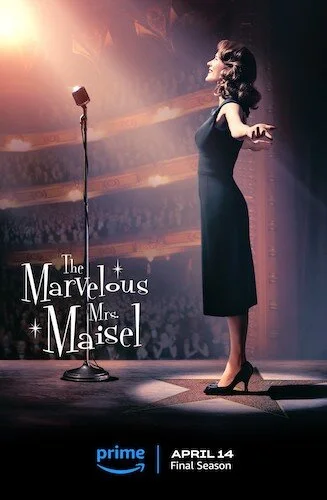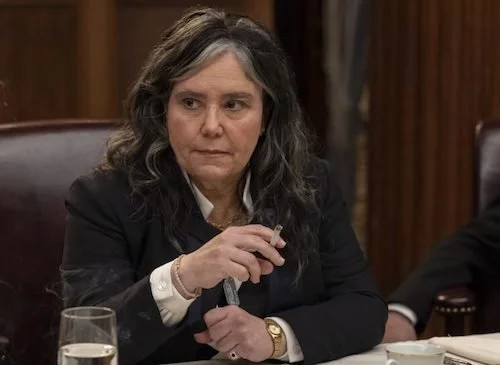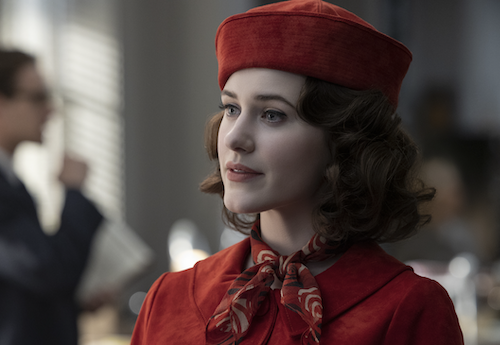The Marvelous Mrs. Maisel Season 5: Binge, Fringe, or Singe?
Written by Andreas Babiolakis
Binge, Fringe, or Singe? is our television series that will cover the latest seasons, miniseries, and more. Binge is our recommendation to marathon the reviewed season. Fringe means it won’t be everyone’s favourite show, but is worth a try (maybe there are issues with it). Singe means to avoid the reviewed series at all costs.
Warning: this article includes full-on spoilers for The Marvelous Mrs. Maisel, particularly the final season and series finale. Reader discretion is advised.
Remember when Amazon Prime was first a streaming service, and its flagship series, The Marvelous Mrs. Maisel, was untouchable? When the Amy-Sherman-Palladino-created show swept so many awards as if it came out of nowhere to dominate? Times sure have changed. Streaming services felt like the bulletproof future of television. Now, we can see that streaming can churn out fluff — nay, filth. Forking over as much money as a budget needs doesn’t guarantee perfection. There are also far too many streaming services now so consumers face a thin pool of content and an expensive, monthly collection of subscription-based fees just to keep up with a minority of today’s best series. The Marvelous Mrs. Maisel also had its share of ups and downs. Season 3 felt like a retread of themes and ideas of the previous two seasons, and season 4, while still enjoyable, felt like a dead end. As if we restarted the entire series, only this time Midge Maisel starts her career at a burlesque nightclub instead of The Gaslight Café.
That’s kind of the point, though: being a female professional, especially back in the fifties and sixties, is an uphill battle when systemic sexism exists. At the same time, it makes for chewy storytelling: the kind that you’re itching to go somewhere in fear that it will become stale. When it was revealed that season 5 of The Marvelous Mrs. Maisel would be the final season, it almost felt like a surrender to me. If they were floundering in season 4, this clearly was a sign that everyone forgot what made the series special in the first place and that it was best to just call it quits now before the show becomes even worse. That’s honestly how it felt, and I was worried: this once terrific show was just going to burn out.
Well, it absolutely didn’t.
If anything, the final season of The Marvelous Mrs. Maisel has me rethinking the entire series and wondering if this was the endgame this entire time. Despite the slight issue of length, I have new respect for the fourth season now. Everything makes sense in hindsight. I won’t pretend that the series is now free of blemishes, but I’m thrilled that it ends on such a high note. Just like its titular character, the series didn’t go out without a fight, was always charming even during its worst moments, and it left us wanting more once it was all said and done. For me a great series can lose prestige if it ends poorly. What about a great series that turns so-so that concludes triumphantly? Well, that may make The Marvelous Mrs. Maisel worth talking about again. It was all that people could discuss at one point. It disappeared during its slower years. I’m making the point that the series must be remembered once more, because revisiting it at this very point may make you never forget about it ever again.
The time jumping in The Marvelous Mrs. Maisel is used effectively and strictly for storytelling purposes; not once do these sequences and/or episodes feel like gimmicks.
We start where we left off: a dejected Midge Maisel, at the end of her rope post a successful Lenny Bruce show, spotting a Gordon Ford billboard during a damning blizzard. She kicks off season 5 with hypothermia. She tells her manager Susie Myerson that she will accept opening act gigs if it will continue her career as a comedian. Additionally, she wants to score a position on The Gordon Ford Show, and she does: as a background writer, and one that barely gets taken seriously to boot. She would have preferred a spot for the world to see: so she can finally get that big break. That isn’t to be the case.
And yet it is. The Marvelous Mrs. Maisel does something different in its fifth season: flash forwards. The series has always been nostalgic, sure, but for the time period it takes place in. In this season, it leaps from decade to decade, either for short bursts (a look at Midge’s future) or for a lengthy period of time (a roast “honouring” Susie for almost all of “The Testi-Roastial”, which takes place in 1990). We know for a fact that Midge Maisel will be an icon not just because we get a hunch, but because the series flat out tells us she will. She appears on 60 Minutes, you can see her empire, and other telltale signs. We also get foresight into her strained relationship with Susie, who is knee deep in trouble with the mob because of her acts of desperation to help Midge and herself (maybe the wallowing in season 4 was necessary to get here?). We notice for decades that the two — who are like peanut butter and jelly — have lost almost all contact with one another. It’s a question of concern that carries your investment throughout the season.
As Midge’s legacy soars (and Susie’s, too, whose future is one of major wealth as well after representing some major clients), her “present” in the sixties stalls. Gordon has hired Midge as a writer, sure, but almost none of her jokes get used. Furthermore, he has a petty rule indebted to the height of his own ego: anyone that works on the show cannot guest on the show. That’s bad news for Midge, who wanted to get her big break on national television (the show’s timeline so cleverly implements the rising necessity for television to get anywhere in the entertainment industry, and its path towards this conclusion is a natural one). Furthermore, there’s a lot going on at home. Her parents, Rose and Abe Weissman, seem to only be going backwards success wise, and now they are starting to reach marital issues (particularly due to the stubbornness of both spouses). Midge’s ex-husband, Joel, also seems to be drowning with his own issues, including the departure of his girlfriend, Mei, whose family never would have let Joel into the picture for a multitude of reasons (additionally she needs a fresh start after the traumatic event during the season 5 premiere, “Go Forward”).
It’s as if season 5 acknowledged the staleness of the previous run and is purposefully relishing in the limbo of life. So many people are starting back at square one (or are threatened with this possibility). As the series continues, it’s clear that everyone starts to learn to be okay with their predicaments: as long as we have each other, we will be okay. It’s when Midge and Joel actually start to fall in love again, and none of this chemistry feels forced or shoehorned in. It’s why so many people fall in love (or back in love) this season. It’s why Susie becomes so appreciative of her surroundings when she comes across an ex lover (a backstory we really didn’t know about until now). Despite all of this, Midge wants to “go forward”, as she was once instructed by a big, snow-filled billboard during her time of need. We know she will. We’re just waiting for that certain moment.
It comes in the form of a sublime series finale, “Four Minutes”. Gordon finally grants Midge some air time after much pressuring, and she invites everyone over to the studio to watch her big break live. With mere seconds to go until The Gordon Ford Show hits the airwaves, Gordon reveals he is just going to quickly plug Midge as a writer; he cut her down from being a guest spot act to being filler material. She’s due to guest alongside Carol Burnett (an incredibly appropriate star to showcase, considering how much of her own path she had to carve in the comedy and television worlds). Now she will just be a sitting egg on a stool. After they cut to commercial break (where Gordon cuts her air time even more out of spite, once she starts getting laughs from the audience over him), she recalls her very first performance: her barging onto a stage drunk and without care. She was never supposed to become a stand-up comedian. It wasn’t in her cards. She’s a woman, and women were frowned upon for doing this back then. She’s a mother that had to take care of her husband and kids. She ignored all of these bigoted, preconceived notions. Why should she let Gordon stop her from this opportunity?
So she hijacks the remainder of the episode with what is easily her best routine of the entire series (and that’s saying a lot because some of the best writing of the show was saved for her stand-up time and time again). We know it. The audience on the set knows it. Even that jackass Gordon Ford can’t help but guffaw by the end of Midge’s routine. She is just too good to ignore. Gordon even offers her a quick guest spot on the coveted couch (that only stars sit on) and interviews her with fresh new eyes (all before promptly firing her, because she broke a few major rules but also to spare her of this job so she can finally blossom and become a bonafide star).
The Marvelous Mrs. Maisel concludes triumphantly, and it is this magnificent landing that solidifies the entire series as a great one at the tail end of the Golden Age of Television.
It’s important to note the very start of this finale involves Lenny Bruce absolutely bombing on stage: having squandered his own big break that could have sent him into the stratosphere. After Midge’s dynamite breakthrough, we flash back to her and Lenny having dinner together, with the latter being certain that the former would be a star. It’s sad to see a promising talent succumb to his own personal demons and throw everything away, but it’s important to know just how calculated every single step of Midge’s career has been. Did she give up when she was banished to the prisons of the club scene? No. We know she didn’t take her television debut for granted either, since we see her succeed decades later and well into her seventies. It’s crucial that we see a giant fall so we appreciate Midge’s astronomical climb so much more.
We finally cut to the twenty first century and the resolution we needed: Midge and Susie are still friends, although they live in different continents now and communicate via phone. We don’t get all of the details as to how their friendship rekindled, but I assume things changed when Midge sent in a video roast out of love for Susie’s ceremony (perhaps she reached out to Midge after the fact). They are watching taped episodes of Jeopardy! together. The category we see before they get deep into their funny banter is one about established billionaires, and it’s impossible to ignore that all of the answers are men. I was hoping Midge would have been revealed as one of the “answers” on the board in this category, but it isn’t so. There has always been a disparity between men and women in the world, and there continues to be in varying ways (the pay gap for starters). What’s worth noting is that women like Midge (or Carol Burnett, who is a real person and whose likeness was featured in this episode in a similar capacity) changed things for others. There will always be groundbreaking minds that will silence the hateful, and the feeble minded ways of traditionalism hellbent on problematic viewpoints. Midge Maisel may not be one of those billionaires, but she is Midge Maisel: a one of a kind talent that made her line of work possible for any woman. Replace her name with Carol Burnett, and you’ll have the real life version of such a story.
As terrific as shows like Barry, Ted Lasso, and Succession (the latter being one of my all time favourites) have been in general, it’s a shame that all of these series (potentially Ted Lasso, but definitely the others) are ending and that The Marvelous Mrs. Maisel is as well but without nearly the same focus. Are we forgetting how impossible it was to ignore this series before? Well, reexamine the series with that same vitality. The Marvelous Mrs. Maisel’s final season is easily one of the best things on television this year thus far, and I have yet to fully digest how I feel about today’s finale outside of knowing that what I watched was special. The series ended with as much natural talent and wit, and as many transformative sets and costumes, and contexts as it ever had. It came from the same school as Mad Men and carved the path for something like Hacks. At the end of the day, it stands alone: imperfect at times, but worthwhile through and through. The Marvelous Mrs. Maisel ends with sociopolitical, nostalgic, and comedic magic: a reminder that legends will pass the test of time, but we have to ensure that we don’t lapse into problematic histories. The best of the best will climb any hill, but maybe we should stop having hills for certain groups of people to climb regardless. This series wound up being more than just marvellous: it’s Mrs. Maisel through and through, and that makes it all the more exceptional.
Andreas Babiolakis has a Masters degree in Film and Photography Preservation and Collections Management from Toronto Metropolitan University, as well as a Bachelors degree in Cinema Studies from York University. His favourite times of year are the Criterion Collection flash sales and the annual Toronto International Film Festival.






